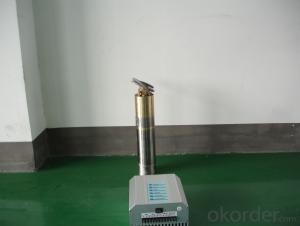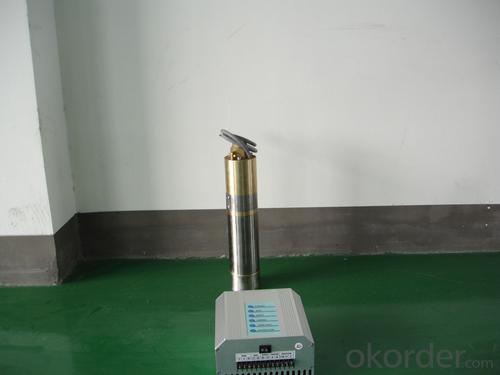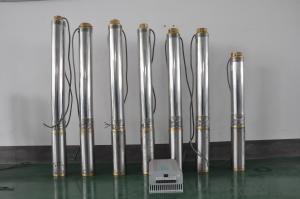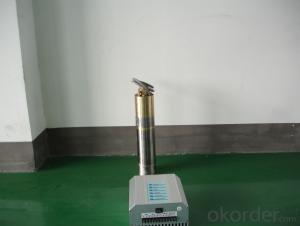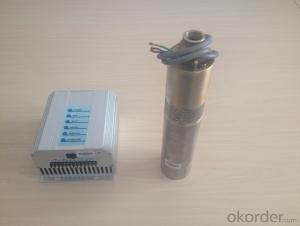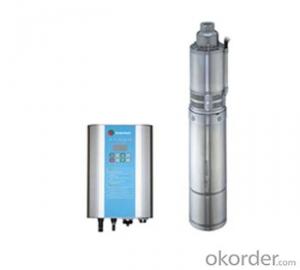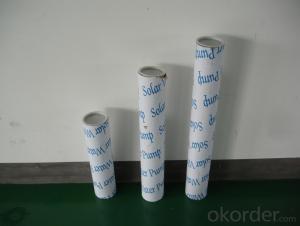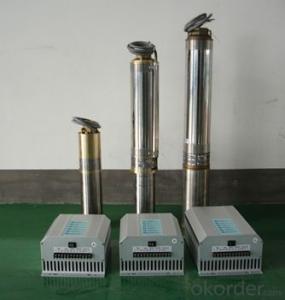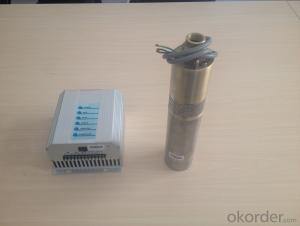Aquaponics Solar DC Solar Submersible Pumps
- Loading Port:
- China Main Port
- Payment Terms:
- TT OR LC
- Min Order Qty:
- -
- Supply Capability:
- -
OKorder Service Pledge
OKorder Financial Service
You Might Also Like
Item Description :
This superb new addition to our solar fountain range comes with a 10w solar panel,and a powerful fountain pump that is capable of producing fountains of up to 2m in height. As well as being easy to set up and use.Instruction manual is supplied for assembly and maintenance.
Solar Fountain Key Features :
Powered by direct sunlight
No high voltage electric mains required
Safe for children
Max. height of fountain: 2M
Max. flow capacity: 800 L/H(176 GAL)
10W Polycrystalline solar panel included
18V DC brushless pump
Solar Pump Features :
Can produce fountains up to : 2M (tube height) 1.4M (fountain height)
Comes with multiple nozzle accessories
Cable Length : 5M
Solar Panel Features :
10W peak power.
Polycrystalline highly efficient solar panel
Comes mounted in aluminium frame
Comes with ground stake and rotating knob so you can angle your panel toward the sun
What You Will Get :
10W solar panel
Solar pump
Ground Sake
Nozzle accessories
Precautions :
DO NOT alter or change the product itself or its components
Operate pump in freshwater only, never above 50 degrees celsius
Keep away from flammable liquids
Do not connect to any other power supply other than the included
- Q: Can a solar pump be used for fish farming or aquaculture?
- Yes, a solar pump can be used for fish farming or aquaculture. Solar pumps are a sustainable and cost-effective option for providing water circulation, aeration, and filtration in fish ponds or aquaculture systems. They can help maintain water quality, oxygen levels, and overall health of the fish, while reducing dependence on grid electricity or conventional pumping systems.
- Q: What is the role of trackers in a solar pump system?
- The role of trackers in a solar pump system is to optimize the efficiency of the system by adjusting the position of the solar panels to track the movement of the sun throughout the day. This allows the panels to capture maximum sunlight and generate maximum power, resulting in increased pump efficiency and overall system performance.
- Q: How does a solar pump handle water with high levels of hardness or scaling potential?
- A solar pump can handle water with high levels of hardness or scaling potential by utilizing a filtration system or descaling mechanism. This helps prevent the build-up of mineral deposits or scaling on the pump components, ensuring smooth operation and longevity.
- Q: How does a solar pump handle water with high levels of algae or cyanobacteria blooms?
- A solar pump can handle water with high levels of algae or cyanobacteria blooms by utilizing various filtration systems. These systems, such as screens or mesh filters, help prevent algae or cyanobacteria from entering the pump system, thus reducing the risk of clogging or damage. Additionally, some solar pumps have built-in UV sterilizers that destroy algae or cyanobacteria cells, ensuring cleaner water output. Overall, solar pumps are designed to handle water with high levels of algae or cyanobacteria blooms effectively and efficiently.
- Q: Can a solar pump be used for hydroponic farming?
- Yes, a solar pump can be used for hydroponic farming. Solar pumps are an efficient and environmentally friendly option for providing water circulation in hydroponic systems. They can be used to deliver nutrient solutions to the plants' roots, ensuring proper hydration and nutrient uptake without relying on traditional electricity sources.
- Q: How does the type of soil affect the installation of a solar pump?
- The type of soil can have a significant impact on the installation of a solar pump. Different soil types have varying levels of permeability, which affects how water is absorbed and drained. In sandy or loose soils, the water may drain quickly, potentially leading to instability and sinking of the pump system. On the other hand, clay or compacted soils can result in poor drainage, potentially causing water to accumulate around the pump system and adversely affecting its performance. Therefore, selecting the appropriate installation technique and ensuring proper soil preparation is crucial for the successful installation and long-term operation of a solar pump.
- Q: Can a solar pump be used for irrigation in saline soils?
- Yes, a solar pump can be used for irrigation in saline soils. However, certain considerations need to be taken into account. Saline soils can affect the efficiency and lifespan of the pump, as well as the quality of water being pumped. It is important to select a solar pump that is specifically designed to handle saline water and has appropriate filtration systems. Additionally, regular maintenance and monitoring of the pump's performance are crucial to ensure its optimal functioning in saline soil conditions.
- Q: Can a solar pump be used for water supply in off-grid wineries?
- Yes, a solar pump can be used for water supply in off-grid wineries. Solar pumps are a sustainable and cost-effective solution for pumping water in remote locations where access to electricity may be limited. They harness the power of the sun to operate, making them an ideal choice for off-grid wineries that require a reliable water supply for irrigation or other purposes.
- Q: Can a solar pump work during cloudy or rainy days?
- Indeed, a solar pump remains functional even on cloudy or rainy days. Although its efficiency may be compromised in such conditions, it can still operate to a certain degree. Solar pumps are engineered to capture solar energy; hence, when there is less sunlight due to clouds or rain, the pump might not reach its full potential. Nevertheless, it will persist in functioning, ensuring a continuous flow and circulation of water. Moreover, certain contemporary solar pumps incorporate energy storage mechanisms, like batteries, which accumulate surplus solar energy on sunny days and can be utilized to power the pump during cloudy or rainy intervals.
- Q: Can solar pumps be used for swimming pool circulation?
- Yes, solar pumps can be used for swimming pool circulation. They are an efficient and eco-friendly option for circulating and filtering pool water, as they use energy from the sun to power the pump.
Send your message to us
Aquaponics Solar DC Solar Submersible Pumps
- Loading Port:
- China Main Port
- Payment Terms:
- TT OR LC
- Min Order Qty:
- -
- Supply Capability:
- -
OKorder Service Pledge
OKorder Financial Service
Similar products
Hot products
Hot Searches
Related keywords
